Black Panther: Not the First Black Superhero Film but the Most Impactful
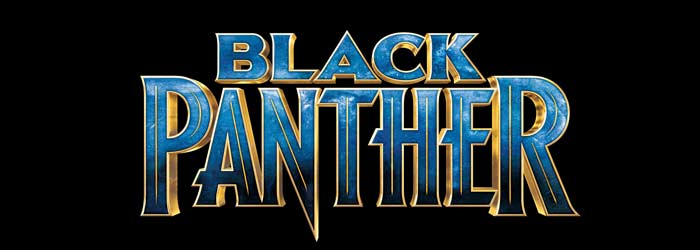
Ever since Superhero comics were made fans and audiences always wanted to see such iconic characters on the big screen, with the release of Richard Donner’s Superman (1978) as one clear example. Whilst various heroes come and go, the one thing that stems to mind is that most of the well-known superheroes are White. There was no racial tension or prejudice with the creation of these iconic heroes, if anything DC Comic’s Superman and Marvel’s Captain America were created by comic writers and artists who are Jewish. Superman’s allegory is being an immigrant in a new land who wants to use his powers for good to represent the best of humanity. While Captain America was created to convince America to fight Nazis in World War II since creators Joe Simon and Jack Kirby were repulsed by the actions of Nazi Germany, hence Captain America’s cover of his first appearance of punching Hitler in the face became so iconic. For this topic however, despite the well intentions with the creations of these heroes that anyone can look up to and be inspired by, there weren’t really many heroes of colour back then.
In comics today there are a lot of heroes who are people of colour (whether they are Black, Latino, Asian or Arabic) but not many have made many appearances when it came to cinematic adaptations. Especially, and this is crucial, as a lead hero. Fast-forward to 2018 and cinematic history has been made with the creation of Black Panther (2018), a film that not only has a Black superhero as the main focus but the film is also a powerful representation for all of Black people young and old today. As the 18th film of Marvel’s ongoing Cinematic Universe Black Panther made a strong impression with its marketing campaign with how it is not like the other Marvel films that came before it. This drew the ire of many comic book fans however not in the terms of what Black Panther represents, but rather how the film’s marketing gives the impression that Black Panther is the “first” Black superhero to get his own film. Technically speaking Black Panther IS the first for the Marvel Cinematic Universe, but not for cinema entirely. But to understand why Black Panther plays such a critical role for representation today we have to look back at those that came before hand and see how far representation has come for African-American superheroes in film.
As a disclaimer, I should note to the readers that I am not Black and I am no way intending on trying to speak on their behalf. I just want to present how far Black superhero films have come in time to point out why Black Panther is a culturally important film for today’s time. Whilst a fan of superheroes, the Marvel Cinematic Universe and with consideration of equal opportunities and representation in the media, Black Panther is a culturally important milestone in cinema today.
Meteor Man
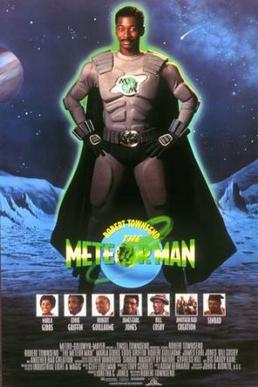
One film to talk about is actually not well-known today with most movie-goers but it is important for Black representation actor Robert Townsend created the very first Black superhero film, Meteor Man (1993). Townsend stars as a mild-mannered schoolteacher named Jefferson Reed who becomes a superhero after his neighborhood in Washington D.C. is terrorized by street gangs after being struck by a giant green rock from space, not to be confused with kryptonite. Meteor Man’s abilities consist of the basis powers such as x-ray vision, flight and…dog telepathy…forgot to mention that Meteor Man was also a superhero comedy film. The movie didn’t do great at the box office but it is important for what it represented. An original superhero created from scratch by a person of colour. This idea and inspiration drew in so many African-American actors who were excited and wanted to be involved with this film such as James Earl Jones, Marla Gibbs, and the late Robert Guillaume. So while Meteor Man may not be well-known with the average movie-goer, Robert Townsend’s creation is critical for the importance of Black representation in film.
Spawn and Steel
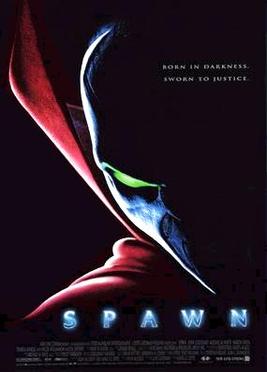
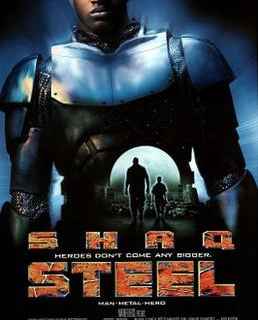
Four years after Meteor Man we were presented with the first African-American superhero film based off an existing franchise, Spawn (1997). Michael Jai White plays the lead as the film begins with the murder of soldier/assassin Al Simmons. Al is resurrected to be come the reluctant demonic leader of Hell’s army under the name of Spawn. He ultimately refuses to lead the army in the war against Heaven and turns away from evil as he seeks revenge against the one who killed him so Al can be with his wife again. There were some good elements in the film, John Leguizamo being entertainingly cheesy and the makeup was good since the people who made them also worked on Walking Dead and the Evil Dead movies. But the backwards storytelling, clumsy editing and awful effects killed Spawn’s performance in theaters upon release. Unfortunately, a few weeks later after Spawn’s release there was one other film that would do worse, Steel (1997)
Steel starred the now retired basketball player, Shaquille O’Neal, as he played John Henry Adams who became the hero of the same name as the plot centers on an accident caused by Burke which leaves Sparks paralyzed. Resulting in Irons quitting his job. Burke begins mass-producing weapons and selling them to criminals. In order to stop Burke, Irons and Sparks create a suit of armor that leads Irons to become the superhero Steel. The film was a financial and critical bomb at the time of its release, most of the criticisms regarded the story, bad acting and lousy effects, especially when it came to the costume where despite the namesake, Steel’s costume looked so fake and plastic that it would make Michael Keaton’s molded plaster armor in Batman (1989) look more convincing. The film took creative liberties from the original comic where Steel was originally planned to be one of the replacements for the then-deceased Superman who eventually became his own hero. Even if the film attempted to be faithful to its original source, this film was already doomed from the start.
1997 was not a good year for the first two African-American superhero films as that was the time when Batman and Robin (1997) was released, the film that many people declared back in the day to be the death of superhero films, and films like Spawn and Steel are examples of that said death. It wouldn’t be a year later until things turned around for superhero films when Marvel decided to take their chances with the film that actually revolutionized the comeback of superhero films, Blade (1998).
Blade
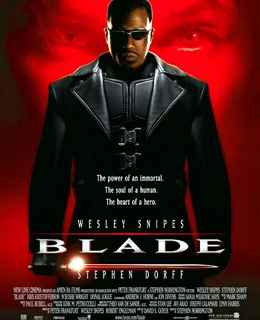
Blade came out at the time when superhero films were dying as mentioned earlier but the film’s performance and better reception kept the genre from truly being dead. Wesley Snipes plays Eric Brooks who is a man with vampire traits that protects humans by being a vampire hunter. Blade attempts to track down a group of evil vampires that seek to wage war on humanity as Blade himself does whatever he can to prevent giving into his urges to drink blood from victims. The film’s popularity at the time managed to earn itself a sequel with Blade II (2002) where it was met with the same reception as the last film, but then Blade: Trinity (2004) came out and that critically panned film ended the vampire hunter’s career.
In terms of Blade’s concept, the character first appeared in Marvel Comic’s The Tomb of Dracula #10 in July 1973 and was created by Marv Wolfman and Gene Colan. His look back then was more stereotypical of African-Americans in the 1970s with a green leather jacket, yellow shades and an Afro. Nothing racist but it was over the top that felt like a parody of the Black exploitation films of its time such as Shaft (1971) and Dolemite (1975). In time though Blade was given a makeover to properly fit with the modern times as seen with Wesley Snipes’ iconic portrayal.
In regards to Black representation, Blade’s concept and creation doesn’t really seem like much at first glance, especially when keeping in mind Blade was created by two White men who had no agenda or deep intentions when creating the vampire hunter. Blade at the time could just be seen as a tough Black guy who kills vampires, but his popularity and impact among readers helped gain him a following to be considered one of Marvel’s most valuable properties. Sometimes it’s just the image alone that can make a big step for representation.
When it comes to Blade’s first cinematic venture, to his credit Blade did set the path for change in not just superhero films but also for representation of the lead hero. At the time there wasn’t so much of a focus of cultural representation, fictional or not in superhero films but Blade was what the film that gave everyone, especially African-Americans, a Black superhero that did not take any crap, killed a lot of vampires, who was tough, strong, and was unapologetically Black.
Storm (X-Men)
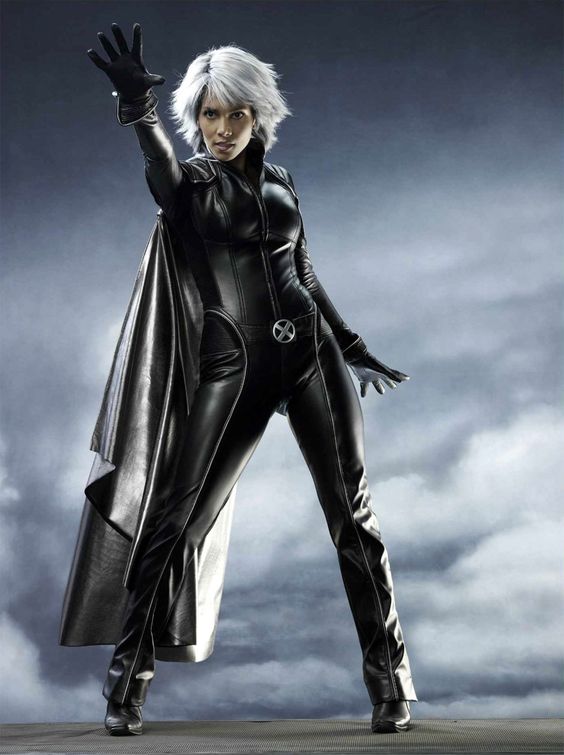
Unfortunately even with the success of Blade there haven’t been much of African-American superheroes in the lead for some time resulting in those that are to be supporting characters. This was the case of Storm from the X-Men (2000). Halle Berry plays Ororo Munroe, a mutant who goes by the name of Storm, and as the name implies her powers includes manipulating the weather and elements that surrounds her. And yet for a very powerful mutant her role in the movies has been minimal, this was more due to the fact that despite having a large cast of popular and iconic characters, most of the film up to X-Men: First Class (2009) focused a lot more on Wolverine due to him being the face of the franchise. This changed in X-Men The Last Stand (2006) where after Charles Xavier’s supposed death; she became the new leader of the X-Men and was able to defeat Magneto. After that film Storm has made fewer appearances since then.
In terms of representing a hero of colour, Storm didn’t seem to offer much, nothing that can be seen as insensitive but rather just missed opportunities. Especially considering that Storm is one of the very first Black superheroines of African descent to be created in comics back in 1975 by Len Wein and Dave Cockrum. In addition, she was queen of Wakanda for a long time when she married her childhood romantic interest Black Panther until they divorced years later. Storm’s heritage was important as even Halle Berry attempted to portray her character with the Kenyan accent in the first film, but was dropped later from the later films. So Storm’s lack of potential in the films could be seen as more of an indication from not including her connection to the rest of the Marvel universe and the films as mentioned earlier, giving more screen time to Wolverine than the other characters like Storm herself. And yet despite the lack of focus that a popular character like Storm received, Halle Berry took on a role afterwards that…to put it bluntly, was a total disaster.
Catwoman

When it comes to the decisions made when making Catwoman (2004) into a feature film everyone had the same question…WHAT WERE THEY THINKING?! Basically Catwoman shared the same problems Steel did when taking great liberties from the original comics and completely robbing the character of what made her so popular. Catwoman of DC Comics, often known as Selina Kyle is a thief, anti-hero, and the love interest of Batman. While White women always portrayed Catwoman for years, Eartha Kitt was the exception when she succeeded actresses Julie Newmar and Lee Merriweather to play catwoman in the 1960’s Adam West Batman series. So having an African-American actress play the character was never the issue, the issue with the film was everything else. In the movie, Halle Berry plays Patience Phillips who is a meek designer that discovers a dark conspiracy within the cosmetics company she works for, involving a dangerous product, which can cause widespread health problem. She dies after falling into a pier but is then revived by Egyptian cats that grant her with superhuman cat-like abilities. These allow her to become a superhero crime fighter, Catwoman, so she can save humanity, while also falling in love with a police detective that pursues her. And you are already slapping your own forehead from realizing how dumb this plot is.
There’s not really much to say about Catwoman in terms of representation since it presents nothing considered racist, rather everyone is focusing more on how horribly botched the film was. Roger Ebert put it best when he listed this film as one of his most hated films of all time by criticizing the filmmakers for not giving Halle Berry the opportunity to portray strong female character but rather just making her eye candy. This film did so bad that Halle Berry even won the Razzie award for worst actress of the year as she accepted it in person along with her Oscar that she won for Monster’s Ball. Though to Halle’s credit, she accepted it with a good laugh and made this statement: “First of all, I want to thank Warner Brothers. Thank you for putting me in a piece of shit, god-awful movie… It was just what my career needed.” In short, Catwoman and Halle Berry deserve better.
Hancock
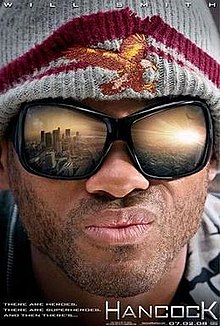
Four years later we were greeted with another African-American superhero film simply known as Hancock (2008). The movie tells the story of a vigilante superhero, John Hancock, played by Will Smith, from Los Angeles whose reckless actions due to being an alcoholic routinely cost the city millions of dollars. Eventually one person he saves, Ray Embrey played by Jason Bateman, makes it his mission to change Hancock’s public image for the better. Smith in an interview described the character of not being your average superhero. Waking up everyday being mad at the world, doesn’t remember what happened to him and there’s no one to help him find the answers. Pretty much like a more cynical take on heroes like Superman which Hancock himself is supposed to be a parody of.
Hancock shares the same sentiment as some of the earlier films like Spawn and Steel but without being based on an existing property. However, aside the notion that Will Smith is another African-American actor playing the lead role as a superhero, the film doesn’t really present anything new or thought-provoking to the audience in terms of representation. Basically Hancock an interesting premise but was clumsily executed. In addition, pending on the audience’s expectations of Will Smith’s performances in his other works regardless if the film is good or bad, Smith’s more cynical portrayal can be seen as polarizing since the story is misguided with what it wants to be. Some might like Will Smith’s more negative approach as of means to give his character depth, while others may find it distracting with the tonal shifts between comedy and drama. So while Hancock is representing African-Americans as being the leading character in a superhero film, it is up to the audience to decide if the film is worth remembering or not.
War Machine
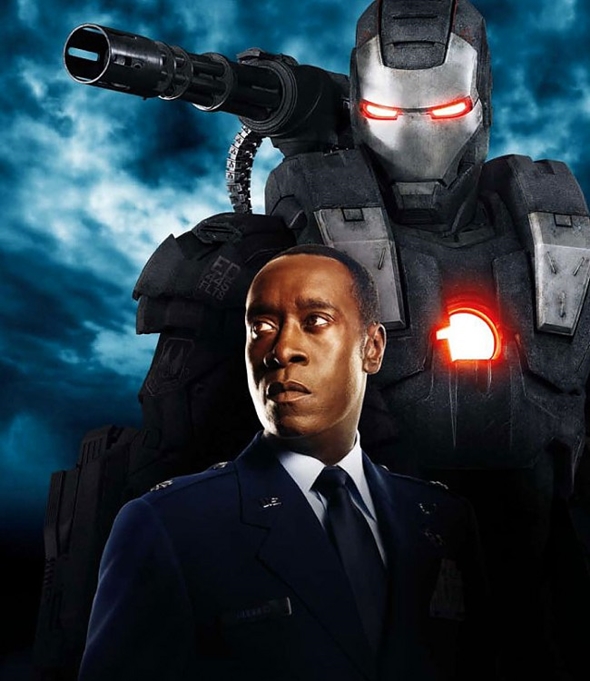
Back in 2008, Marvel took a gamble to try to create its own cinematic universe while using the some of their own properties that they have not owned by other studios. This was due to studios like Sony owning the film rights to Spider-Man and the same with FOX for the X-Men. Marvel decided to take the first step of a superhero cinematic universe the release of Iron Man (2008). While it is important to bring up that Robert Downey Jr., who is Caucasian, plays the leading role most casual moviegoers may not be aware that one supporting character is also one of Marvel’s major African-American heroes. That hero is James “Rhodey” Rhodes, also known as War Machine.
In the first film Terrance Howard plays James Rhodes, but as of Iron Man 2 (2010), the role of James Rhodes has been since then portrayed by Don Cheadle, who would then become the first African-American actor to wear the War Machine suit in film. War Machine is not only the best friend of Iron Man, but is the best counter-opposite in terms of personalities and outlooks. James Rhodes is the Lieutenant Colonel of the U.S. Air Force and is a firm believer in people being held accountable for their actions and a proper chain of command. After confiscating the Mark II armor for the U.S. Air Force, they made a heavily weaponized version of the suit and after teaming up with Iron Man to deal with the villain Whiplash, Rhodes then takes on the superhero mantle of The War Machine and officially becoming a member of The Avengers after the events of Age of Ultron (2015).
Regarding War Machine’s representation of African-Americans, Howard was excited to play as Rhodey since he and his father are Iron Man fans, partly because Rhodes was one of the few Black superheroes when he was a child as Howard stated in an interview back in 2008. But due to contract disputes with Marvel when filming Iron Man 2, Howard was dropped from the role and Don Cheadle took over as mentioned earlier. In contrast, Cheadle stated in an interview that while he is a comic book fan, he didn’t partake in and comic adaptations back then due to the scarcity of Black superheroes. Cheadle made a good point that aside the earlier films starring African-American superheroes mentioned earlier, the entire superhero gallery has been mostly dominated and portrayed by White people. And while War Machine may not have his own movie, Don Cheadle at least has bragging rights since his character is the very first African-American superhero to join the Avengers within the MCU.
Falcon
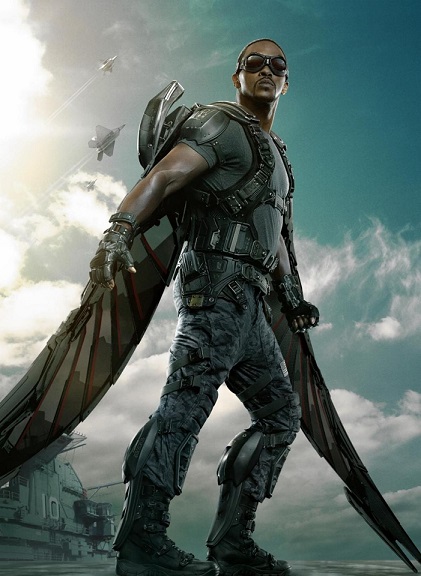
War Machine is not the only African-American superhero to join the Avengers in film, for around the same time another Black superhero joins the fray, Falcon. Anthony Mackie plays as Sam Wilson, making his first appearance in Captain America: The Winter Soldier (2014). Sam Wilson is a former United States Air Force pararescue airman who then began helping fellow veterans suffering from post-traumatic stress disorder at the Veterans Affair. During this time he became an ally to Captain America during the HYDRA Uprising while helping Steve Rogers search for Bucky Barnes with the use of his specially designed wing pack. After the events of Age of Ultron, Wilson then joined the Avengers under the guise of Falcon.
In regards to representation in Marvel Comics, while Black Panther holds the title of being the franchise’s first Black superhero, Falcon is Marvel’s first African-American superhero while also being Marvel’s second Black superhero. When talking about his role as Falcon in an interview, Mackie said the following: “It makes me feel all the work I’ve done has paid off. I have a son, nephews and nieces, and I love the idea that they can dress up as the Falcon on Halloween. They now have someone they can idolize. That’s a huge honor for me.” Like War Machine before him in the MCU, Falcon’s portrayal is very positive. His character is treated as an equal to Captain America and Falcon is a trusted ally and serves as a very reliable member of the Avengers due to his tech, scouting and combat skills.
Deadshot
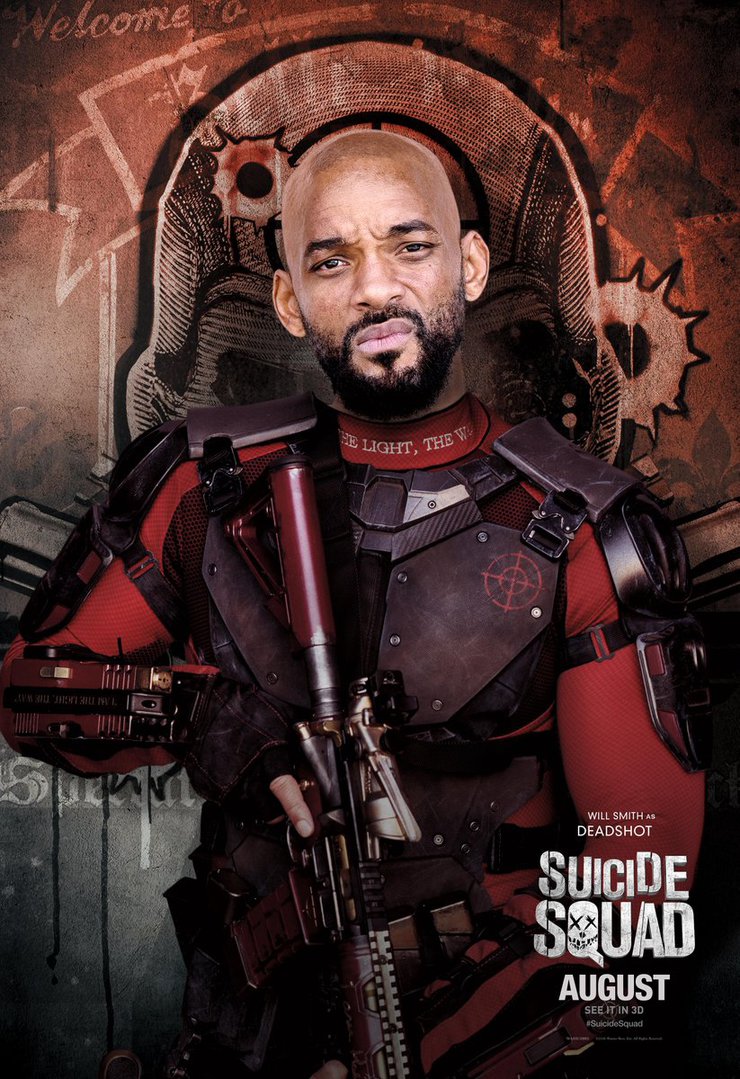
In a setup that was doomed to fail Warner Bros. wanted to play catch up to Disney’s worldwide phenomenon with the Marvel Cinematic Universe by creating their own universe using the iconic heroes of DC Comics. Starting out with Man of Steel (2013), which led to polarizing results as many hoped that maybe Warner Bros. would take the criticisms from the film and improve in the future…three years later and we were wrong…VERY wrong. With the announcement of Batman V Superman: Dawn of Justice (2016) coming out the same year as the highly anticipated Captain America: Civil War (2016) it was clear that Warner Bros. was not being subtle with their approach. A darker take on iconic heroes fighting each other that was not only unpleasant with its execution, but also made no sense overall for why it happened. However, that same year Warner Bros. also released the film Suicide Squad (2016) in their attempt to have a film focusing on a group of DC Comic’s bad guys.
Suicide Squad’s story is about a secret government plan to use a bunch of wanted supervillains who are in custody and prepare them to catch other villains. In relation to this article’s analysis of Black actors playing the lead hero, this film takes a different approach with the squad being lead by the assassin Floyd Lawton, aka Deadshot, played by Will Smith. Known in the film as the “most wanted hitman in the world”, Deadshot is apprehended by Batman while out shopping with his daughter, Zoe. He is forcefully blackmailed to join Amanda Waller’s government task force made to capture other supervillains.
The best way to describe Deadshot in the film is conflicted. Deadshot is a mercenary by day and a concerned father at night. He enjoys the thrill of hunting those he is paid to kill but also wants to do the right thing by his young daughter, creating conflict for his character making him more of an anti-hero for this film. So why talk about Deadshot since he is not a superhero? Well since Will Smith is an African-American actor playing the lead role in this film, it makes sense to talk about him. In addition, since his first appearance in Batman #59 back in June 1950 Deadshot was always seen as a White person in the comics. This film officially made Will Smith the first Black person to portray the Deadshot as a person of colour.
As to why Will Smith agreed to play the mercenary, Smith explained in an interview with Entertainment Weekly that playing Deadshot was a new opportunity for him. In his words: “I had never played a character that legitimately didn’t give a f—. It’s very freeing not having to carry the moral spine of the movie. I couldn’t find a model to understand what would make someone comfortable killing another person for money. David walked me through that. He found a book for me (The Anatomy of Motive by John Douglas), and I worked through getting into the mind of serial killers. Once I accepted the [notion the author puts forth] that it feels good, that really exploded the idea in my mind of Deadshot.” It is not often Will Smith ever played a bad guy so from that perspective it does make his role interesting.
Which leads to the point about Will Smith’s portrayal as Deadshot representing the Black community. In contrast to Will Smith’s last performance as the cynical superhero Hancock, Deadshot’s character is much clearer. Audiences can understand his dilemma since he loves what he does as a criminal but cares very much for his daughter that he wants to do the right thing. So even though Deadshot is not a virtuous hero as those before him, he can still be seen as a protagonist in a sense. While not a very strong role in terms of representation in comparison to Blade, his performance here can be seen as an upgrade. The same cannot be said for the rest of the film though since it reeked of executive meddling and last minute changes in a last ditch effort to make the film lighter after the backlash of Batman V Superman which only hurts Suicide Squad even more. Overall, if anyone wants an actual Suicide Squad film just watch Batman: Assault on Arkham (2014).
Cyborg
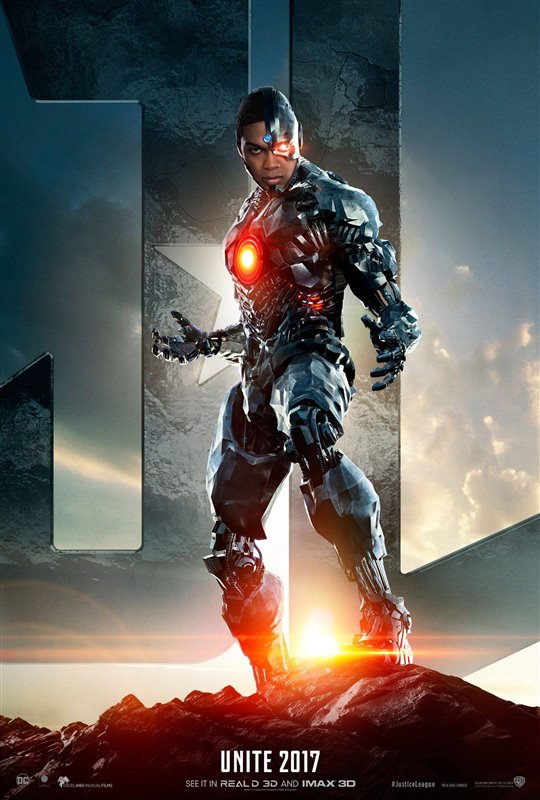
After years of waiting to see how DC Comics would fare against Marvel’s Avengers in film, Warner Bros. finally released Justice League (2017) to…mixed results. As another example for DC’s desperate attempt to catch up to Marvel, in Batman V Superman: Dawn of Justice, the film tried to introduce other superheroes without giving them their own film to develop their own characters. This affected Wonder Woman until her own film in 2017, The Flash, Aqua Man, and the African-American superhero of the team, Cyborg.
Ray Fisher plays Victor Stone, a former college athlete who, after being cybernetically reconstructed after a nearly fatal car accident, is turned into a techno-organic being enhanced by reactive, adaptive biomimetic alien technology, reluctantly becoming Cyborg as a result. In Justice League, Wonder Woman attempts to recruit Victor to help her and Batman to stop the villain Steppenwolf. At first Stone refuses but then agrees to help when his father Silas, along with other S.T.A.R. Labs employees are kidnapped by Steppenwolf in his attempt to find one of the motherboxes. The very alien technology used to bring Victor back to life and turn him into Cyborg. So the race is on to not only stop Steppenwolf from conquering the planet but also use the same tech that made Cyborg in an attempt to bring back Superman.
Much like the other heroes who didn’t get their own film, Cyborg’s character is sadly under developed. Ray Fisher did what he could and made the character quite sympathetic but he had very little to work with how the film was written and directed. Which is a shame because Cyborg is one of DC Comic’s most popular and iconic African-American superheroes created by Marv Wolfman and George Perez. Appearing first as one of the members of the Teen Titans in October 1980, Cyborg eventually became part of the Justice League in DC’s 2011 reboot and the 2016 relaunch. Cyborg is also popular due to appearing in other adaptations such as the much beloved Teen Titans animated series, the DC Lego franchise, and being a playable character in Netherrealm’s popular superhero fighting game series, Injustice. This shows how much Cyborg means as a character and a representation for those that are Black.
For representing African-Americans in Justice League, Cyborg’s role shares similarities with War Machine and Falcon as a supporting character. However, unlike the two Marvel African-American superheroes before him, Cyborg is one of the founding members of the Justice League. Meaning that while his character still needs proper development along with Aqua Man and The Flash, it did not take Cyborg several movies to be a part of the main superhero team that was being built up within the DC Cinematic Universe. And depending on how the studio attempts to relaunch their own universe with the release of Flashpoint in the future, Ray Fisher will be continue to play Cyborg where hopefully the half-man half-machine can get his due and shine with his own superhero film.
Luke Cage
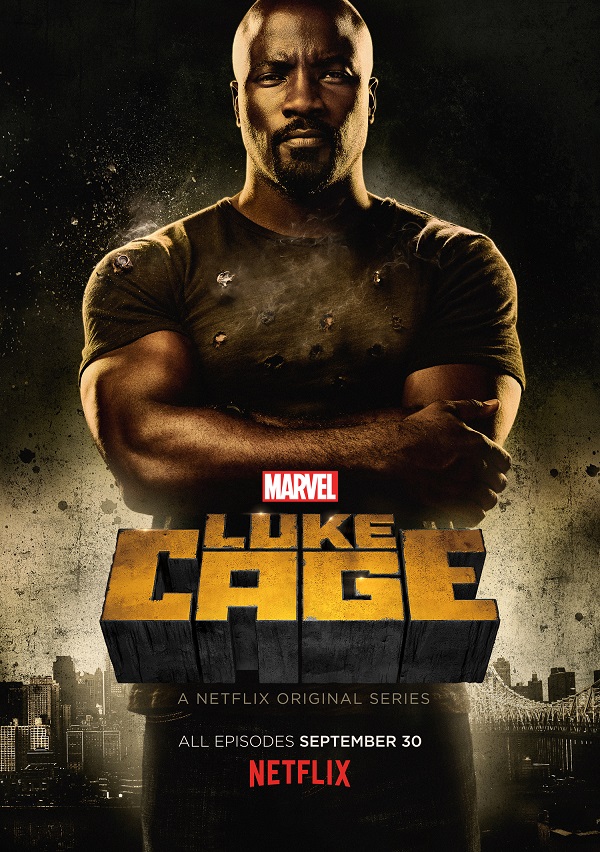
Before continuing on to Black Panther, for this topic it is important to talk about two television shows that feature Black superheroes as the lead and for how they contribute to representation the Black community. The first one being Marvel’s Netflix exclusive series, Luke Cage (2016). The series stars Mike Colter as Carl Lucas who is a former police officer who was wrongfully sent to prison. Through events and experimentations against his will he gained superhuman strength and unbreakable skin as he fights crime in the city of Harlem under the name Luke Cage.
Luke Cage was created back in 1972 at the time when Blaxploitation films emerged as a new genre as he debuted with his cover trademark, Luke Cage, Hero for Fire. Also goes by the alias Power Man. Though much like Marvel’s Blade in the 70’s, Luke Cage’s portrayal was very stereotypically African-American within the conventions of Blaxploitation, but as time marched on, Luke Cage’s character was changed to properly reflect the modern world today. In terms of his first live action portrayal, this is where Luke Cage’s imagery becomes so impactful.
What Luke Cage represents in today’s time is so much more than just relevancy, its political. While his comic origins came about from the rise of Blaxploitation films, his power of being immune to bullets takes on a powerful form of empowerment within the era of Black Lives Matter. This resulted as series creator Cheo Hodari Coker pitched the series to Netflix and Marvel as an examination of Harlem, to which he compared to being like what The Wire did for Baltimore. One example is that the hoodie that Luke Cage wears is actually a nod to Trayvon Martin, a victim of racial police brutality that lead to the Black Lives Matter movement. According to Coker in an interview with TIME, the hoodie is a visual argument against the assumption that a Black man in such clothing is threatening. To which Coker asked: “What if you introduce a bulletproof character into a social ecology that isn’t bulletproof? How does he affect the police? The streets? People in the neighborhood who have turned a blind eye to crime in order to survive?”
In terms of representing African-Americans as Luke Cage, before taking the role Mike Colter stated he turned down many roles because he felt perpetuated the same Black tropes. “I didn’t know whether I was going to be successful in this business because I think you have to ignore the fact that sometimes you’re strictly a stereotype or at the very least you’re not doing anything to undo a stereotype,” Colter explains. This was averted when his character first appeared in Jessica Jones when their characters were in a relationship that didn’t have to do with race. In addition his character thoughtful, reserved, physically imposing but hesitates to use his strength, a rare Black male character that is big in size but is gentle and soulful on the inside. With a Black superhero who is bulletproof who wants to make a difference in his community that not only averts the common tropes of African-American leads in media, but also tackles the heavy themes of police brutality towards people of colour in today’s time, Luke Cage not only represents African-Americans, but also those who are victims of a corrupt justice system.
Black Lightning
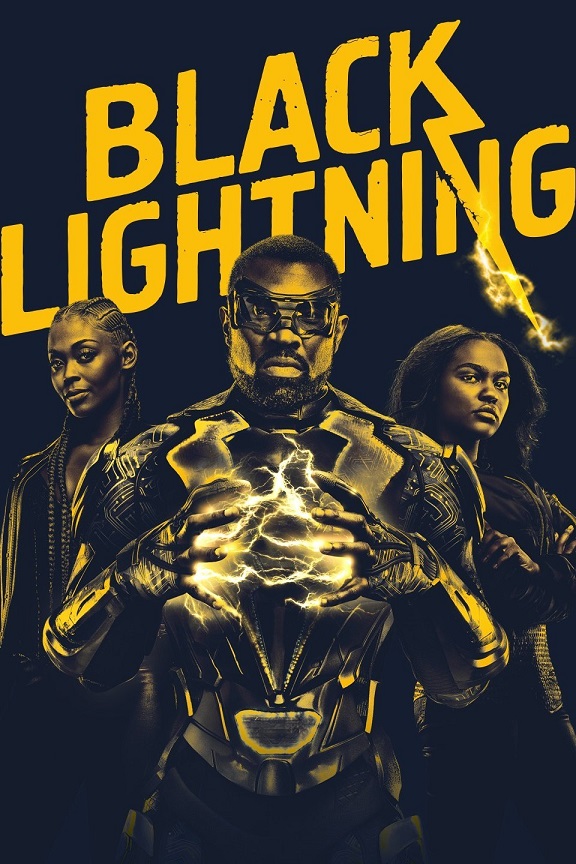
Marvel isn’t the only comic book company to streamline their own Black superhero on television, DC Comics joined the fray as they released their next superhero show entitled Black Lightning (2018). In the comics, Jefferson Pierce was originally depicted as a schoolteacher from the crime-ridden Suicide Slum area of Metropolis who acquires electrical superpowers from a technologically advanced power belt that he puts to use to clean up crime in his neighborhood. Later on, Pierce establishes himself as a successful superhero in the DC Universe, and later stories depict him as having “internalized” the belt’s powers as a result of his latent metagene. Eventually his origins were simplified by depicting him as metahuman with the inborn ability to manipulate and generate electricity, similar to a mutant from Marvel’s X-Men.
While that is common knowledge for the comic readers, the premise for the television show is as follows: Jefferson Pierce, who retired from his superhero persona Black Lightning nine years ago after seeing the effects it had on his family, is forced to become a vigilante again when the rise of the local gang called the 100 leads to increased crime and corruption in his community of Freeland. While DC Comics has been struggling to catch up with Marvel’s success of creating a cinematic universe, the same cannot be said for their television universe. While the show is not part of the ever-growing Arrowverse (Arrow was the first show based off of DC Comics Green Arrow to start its own universe) Black Lightning’s announcement and release has been very popular and impactful.
When looking back at the history of Black Lightning’s creation it actually could’ve been a lot worse. Apparently the character was originally conceived as “The Black Bomber”, a White racist that would transform into a Black superhero when under stress…an idea that was so stupid that Comics historian Con Markstein described the character as “an insult to practically everyone with any point of view at all.” Fortunately, when the editor that approved the idea left, Tony Isabella, a writer who worked on Marvel’s Luke Cage, teamed up with African-American artist, Trevor Von Eeden, created who is crowned as DC Comic’s very first African-American superhero in April 1977, Black Lightning.
Much like Luke Cage’s first outing, Black Lightning’s first step was a bit shaky. Originally Black Lightning was depicted wearing an Afro wig and affecting an exaggerated Harlem jive vernacular as part of his efforts to hide his identity. In time, aside of receiving an update to appeal to the modern audience, Black Lightning later becomes one of the founding members of the Batman-helmed Outsiders superhero team and is given a spot to be a member of the Justice League.
In terms of representation much like his fellow Marvel counterpart Luke Cage, Black Lightning takes a different approach that not only makes itself stand out as a superhero show but also in terms of representing African-Americans. Author Charles Pulliam-Moore helped to illustrate this notion in his article: “Black Lightning is the Blackest Superhero TV Show of All Time.” Charles noted that one element that made Black Lightning stand out to make the audience feel connected is the place that the hero fights crime in, Freeland. To summarize, Black Lightning’s story is rooted in the lives of Black people, never shying away from the issues they all face that other DC superhero shows rarely tackle but doesn’t get heavy-handed either in its own message either. Never insulting one’s intelligence and treats the audience like sensible adults. The article is worth checking out if one wants to understand more about the show’s representation since the author himself is African-American. With a strong production crew of African American writers and actors, Black Lightning delivered such a powerful strike.
Black Panther
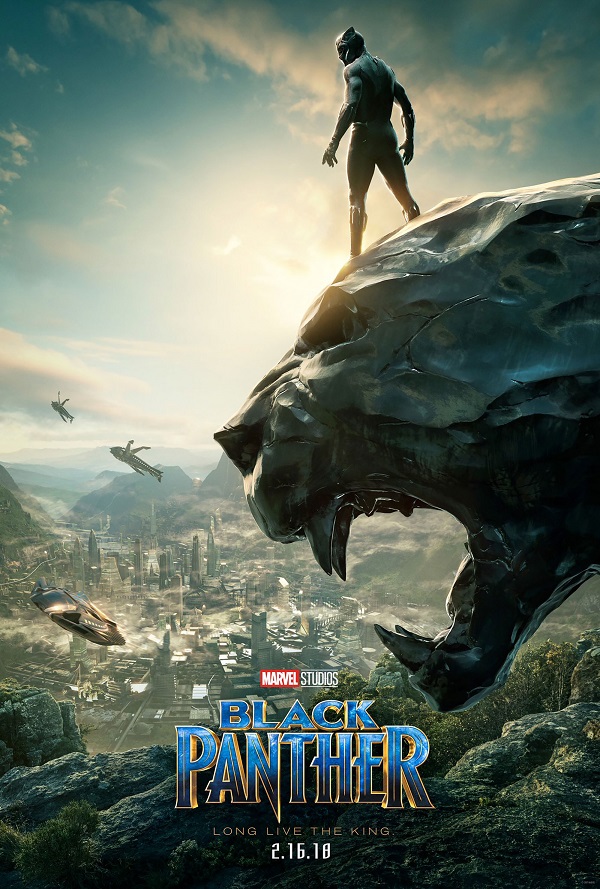
And now we FINALLY come to the big one, one of if not the most hyped up superhero film of all time, Marvel’s Black Panther. Stan Lee and Jack Kirby created Black Panther back in 1966, however there was some confusion since the name was used before the founding of the Black Panther Party in October 1966. Stan Lee denied that the comic was named after any political uses and the term “Black panther”, which concluded that the citing was a strange coincidence. For clarification, Stan Lee recounted that the name was inspired by a pulp adventure hero who has a black panther as a helper, while Jack Kirby’s original concept art for Black Panther used the concept name Coal Tiger. Black Panther debuted his first appearance in Fantastic Four #52-#53 (July-Aug. 1966) and history was made.
Counting down years later with the 18th entry of Marvel’s Cinematic Universe, Black Panther gave audiences for the very first time a film dedicated to the first Black superhero whose origins are not affected by colonialism compared to those we analyzed before. While Black Panther himself did originally first appear in Captain America: Civil War, his character would not only contribute to the massive lore of the Marvel universe but make an impact for people of colour everywhere. Directed by Ryan Coogler, Black Panther is the film that after so many years allows millions of African-Americans to see themselves reflected on the big screen, feeling like they are a part of the movie. As mentioned earlier superhero films have been largely dominated by a White cast because a majority of the heroes were originally conceived as Caucasian. While Blade was the first to give people of colour a starring lead in his own film, most of the time they were from America’s roots in their own stories. Either there were moments made to symbolize and/or show the struggles that Black communities go through or just represent African-Americans by simply starring in a popcorn flick style story. Black Panther averts that for giving a strong cultural African representation in the Black Panther’s homeland of Wakanda, a fictional country that unapologetically showcases a strong and proud African culture and identity.
If there is one thing that will have to be spoiled in terms for this article is the villain of the movie, N’Jadaka, otherwise known as Killmonger. (For those who have not seen the film, feel free to skip this paragraph). Killmonger, played by Michael B. Jordon, is a villain like no other of the Marvel Cinematic Universe, he is complex and yet sympathetic and serves as the counter opposite to T’Challa, played by Chadwick Boseman. Raised in Oakland, California, Erik Killmonger found his father N’Jobu, brother of Wakandan ruler T’Chaka dead in their home for the crime of stolen vibranium. (Fictional metal of the Marvel universe) Killmonger grew up to be a Black-ops solider who plotted to take the throne from T’Challa out of revenge and continue his father’s plan of providing people of African descent worldwide with Wakandan weaponry, so they may fight back their oppressors.
Basically Killmonger is seeking retribution for what has happened to African-Americans since the early days of colonization, slavery and segregation, especially in the case since that Wakanda has the technology and the number to help so many black people who are suffering outside of the kingdom. But for generations, Wakanda has denied helping those who were suffering and instead chose to keep their kingdom hidden from the rest of the world, which basically is a result of isolationism. For more details about Killmonger’s character, the YouTube channel Wisecrack covers this in their video: “Is Black Panther’s Killmonger the Best Villain Since The Joker?” covers at lot about not just the villain but also the theme surrounding the character and how his role is critical to the film.
There are so many elements to cover about Black Panther in terms of representation that doing so would unintentionally spoil the film for those who have yet to see it. But to give an idea, Black Panther can be seen as a love letter to Black culture. When looking back in the early days of American media, Africa was always shown as…being unsophisticated. Often a place where they depict horrific creatures and monsters originating from the continent in many monster movies and having the natives there portrayed as chaotic savages whether it’s from film to even most news coverage in the west. Whereas the film’s vision of Wakanda is a thriving technologically advanced paradise with skyscrapers, speeding trains and spaceships that make the location such a wonder to behold. Everything from the designs, costumes, hair styles and imagery that invoked of Kenyan, Namibian and South African references, this film SCREAMS Black empowerment.
The Black Panther that became Blade
There is one thing to note with the release of Black Panther now is that back in the 90’s Wesley Snipes himself actually wanted to make a Black Panther film first. In an interview with the Hollywood Reporter, Snipes explained his story about how his version of Black Panther was riddled with troubles during production that eventually resulted in the film being cancelled. But it was his inspiration as to why he wanted to make Black Panther is actually what can resonate with a lot of African-Americans today where Snipes said: “I think Black Panther spoke to me because he was noble, and he was the antithesis of the stereotypes presented and portrayed about Africans, African history and the great kingdoms of Africa. It had cultural significance, social significance. It was something that the Black community and the White community hadn’t seen before.” And yet despite the support Snipes had from his agent and with Stan Lee’s blessing, his film was doomed from the start and a lot of that was due to meddling from Columbia Studios.
When Snipes described his vision of Black Panther which is pretty close to how we have gotten that interpretation with Ryan Coogler’s film, Snipes explained in the same interview that despite his intentions to show the glory of Black Panther from the comics, the studio thought Snipes was trying to make a film about the 1960s civil rights movement. The production didn’t have a director and screenwriter they could agree upon and with Marvel declaring bankruptcy back in 1996 no thanks for the speculator boom created by Ron Perelman (Comic industry’s greatest monster) the Black Panther production was stalled. Snipes continued that due to the troubles of finding the right script and director in addition of not having the technology to present Wakanda the way it was in the comics, it made production difficult. So Snipes lamented in his words: “They both [Black Panther and Blade] had nobility. They both were fighters. So I thought, hey, we can’t do the King of Wakanda and the Vibranium and the hidden kingdom in Africa, let’s do a Black vampire.” And that’s how Blade was made as a result since then.
In the same interview, Snipes was eventually asked about Black Panther as it is now to which he stated that he could not be anymore thrilled. In his words: “Even though I am not a part of this particular project, I support it 1,000 percent, and I am absolutely convinced that it will be a catalyst for change and open other doors and other opportunities,” Snipes commented. “And we need that kind of diversity and different flavor now. Boseman is a young, talented actor, and I think he is going to make it his own. I hope they give him a great opportunity to really come into the fullness of the character.”
So for those who are divided on the more important film between Blade and Black Panther, honestly it seems they go hand in hand. Blade is the film that saved superhero films and stared the first Black actor as the lead in the genre that helped for representation, while Black Panther was the film that Snipes always wanted to do but couldn’t due to circumstances back then but not only brought his vision to life, but also made it even more empowering for Black people everywhere for what it gave and represents. And after analyzing the long history of African-Americans starring in superhero films and television shows, they have come a long way. From a rocky start in the late 1990’s to powerful representations in the 2010’s, this is all the more reason to why representation matters. And as of this article the film has made over $920 million dollars at the box office worldwide, it is made very clear that we will be seeing more of Black Panther on the big screen for years to come. Wakanda Forever!
Works Cited
Panthers and Progress: The Rise of Black SuperHeroes. NowThisNerd. YouTube. (2018). https://www.youtube.com/watch?v=FrAm6Wu6Tu0&t=541s
Ebert, R. (2004) Catwoman Movie Review. Ebert Digital LLC. https://www.rogerebert.com/reviews/catwoman-2004
Seijas, C. (2010) “Iron Man 2” star Don Cheadle On Superhero Films And The Character He’d Like To Play. MTV.com. WebCite. https://www.webcitation.org/6AAFIjfdU?url=http://splashpage.mtv.com/2008/10/14/iron-man-2-star-don-cheadle-on-superhero-films-and-the-character-hed-like-to-play/
Beale, L. (2012) “Hurt Locker’s” Anthony Mackie in “10 Years”, Newsday. WebCite. https://www.webcitation.org/6AgIPS3VL?url=http://www.newsday.com/entertainment/celebrities/hurt-locker-s-anthony-mackie-in-10-years-1.3995508
Sperling, N. (2016) Suicide Squad: Why Will Smith signed on to play Deadshot. Entertainment Weekly. http://www.ew.com/article/2016/07/08/suicide-squad-will-smith-deadshot/
Lang, B. (2016) Cyborg to appear in “The Flash” Movie (Exclusive). Variety Media. https://variety.com/2016/film/news/cyborg-the-flash-movie-1201838408/
Dockterman, E. (2018) The Making of Luke Cage: A Hero For This Moment. Time.com. http://time.com/luke-cage-team/
Black Lightning. Don Markstein’s Toonopedia. (2002-2008). http://www.toonopedia.com/b_lightn.htm
Pulliam-Moore, C. (2018) Black Lightning is the Blackest Superhero TV Show of All Time. Gizmodo Media Group. https://io9.gizmodo.com/black-lightning-is-the-blackest-superhero-tv-show-of-al-1822167862
Mitchell, M. (2018) The Secret History of Black Panther by Stan Lee. The Geek Twins. http://www.thegeektwins.com/2018/02/the-secret-history-of-black-panther-by.html
Johnson, T. (2018) Black Panther is a gorgeous, groundbreaking celebration of black culture. Vox Media. https://www.vox.com/culture/2018/2/23/17028826/black-panther-wakanda-culture-marvel
Is Killmonger the Best Villain Since The Joker?. WiseCrack. YouTube. (2018). https://www.youtube.com/watch?v=KUgO7NtgNF0
Parker R. and Couch A. (2018) Wesley Snipes Reveals Untold Story Behind His “Black Panther” Film. The Hollywood Reporter. https://www.hollywoodreporter.com/heat-vision/black-panther-wesley-snipes-reveals-untold-story-behind-90s-film-1078868
What do you think? Leave a comment.











Has not heard of 90% of these. Thanks for the list!
I enjoyed Black Panther. I prefer the Marvel movies like this one where the hero is human with some kind of skill/technology instead of some magical ability that means they are never in any kind of danger.
I think there’s something worth celebrating when a young and very talented black director makes a film with some of the biggest black actors today.
Considering this is Ryan Coogler’s 3rd film in his entire career, what you said totally has value to it!
Timbuktu is an African film I would recommend recently, rather than this bizarre Western fantasy concocted by American comic book artists.
Storytelling is an enormously huge tent, and it has plenty of room for both realism and fantasy, right? We shouldn’t watch Black Panther and somehow think we’re learning anything factual about east Africa today, obviously, but that doesn’t mean that we shouldn’t watch Black Panther.
Meteor Man was and is a classic.
I grew up watching Avery Brooks as Captain Sisko for seven (eight?) seasons of Star Trek DS9. He is the first and only hero. 🙂
I’m a super-Trekkie, and DS9 was one of my fav shows of all time. i taped the entire series on vhs (same with VOY). Lt. Tuvok was also black (and an alien, does that count still?), and my fav eps on the series were holodeck shows, and Tuvok mysteries.
DS9 was 7 seasons long.
I just want the film to be a good one. I don’t actually give a toss what ethnic background the character is – a good film is a good film.
Good piece. We seem to live in time where historical amnesia is the norm. Anything over three months old is, like, oooold.
Black Panther deserves this effort and admire because personally with my own experience, i’ve never seen such of graphics effect and thriller scene before and in the movie it was great story line
Blade 1 & 2 where Much better than Black Panter. Respect for Wesley Snipes for being the first successful black Marvel Superhero.
As a straight white male born in Philadelphia, it has been easy to forget that by birth I had won a portion of the lottery. My culture has been predominant and until my 20’s I only rarely thought twice about how it must be to be an “other”. Just as we all seek water, food, shelter and love, so too do we all wish to belong to something larger than ourselves. Culture is that security blanket which binds us, not only to each other but to a sense that OUR story (like our lives) has transcendent meaning. Film (like music and television) is this connector and works like “Black Panther” “Wonder Woman” simply cast a wider net of inclusion. They may be mere comic books or pulp films but they are that start to our throwing open mainstream culture to those not lucky enough to have been born into the status quo.
Technically only Blade and Spawn were actually representative of an established comic-book character (Steel had just been introduced and was TOTALLY different, the Catwoman character was invented for the film). And yet both Spawn and Blade are darker/grittier, anti-heroes, not the traditional type. That could make Black Panther the first black “traditional, heroic” comic-book adaptation. That might be why it feels so fresh. He doesn’t have to have vampire blood flowing through his veins or report back to hell to be powerful and heroic.
I get your larger, really interesting point (about finally having a black superhero who’s not a vampire or demon), but I’m still going to quibble about a side comment that you made about Catwoman.
Catwoman was not simply “invented for the film.” The character was certainly heavily modified for the film, but she has her origins in comic books. See the wikipedia entry on her: “Created by Bill Finger and Bob Kane, the character made her debut as “the Cat” in Batman #1 (June 1940).” The third (and, in my estimation, the best) incarnation of Catwoman in the 1960s Batman TV series was famously played by black singer and actor Eartha Kitt.
There’s been a lot of modification and revision with the character of Catwoman: from villain to hero, from supporting character to lead, etc.
I see Black Panther as a sign that, eventually, every Marvel superhero will get a decent movie. Except for the Silver Surfer. I think this reflects poorly on us all.
Hollywood films makes changes in society.
As long as it is a GOOD movie, I’ll be in line for it! 😀
There is another one I cannot think of the name of. The guy was married. I think he might have been a teacher or professor. He had problems with his legs and he was trying to create a cure I believe and his new suit gave him super strength. What was that movie?
Are you thinking of Julian Wilkes, who built the Defender in the tv series Viper ((played by Dorian Harewood)? I’ve been looking far and wide, and that’s the closest match I’ve found so far, and it’s not a perfect match. The Defender is a souped-up, superpowered car, not a power suit.
That wasnt a movie that was a TV show called MANTIS starring Carl Lumby
I can’t wait to see some of these! There should be more diversity in Marvel movies.
It’s in the comics – that’s how they are finally able to bring it to screen.
Marvel is a comic universe set in the real world with relatable heroes with real life problems. It is telling that in this real world scenario, they have to make up a technologically advanced African nation. I don’t believe a black panther movie will heal all American race issues. But I believe it occupies a lot of media attention and that is a great thing!
The first Blade movie was not only financially successful but it was also considered good by the masses. Blade is unofficially recognized as the start to the Marvel-Movie dominance. And if I remember correctly, it was the most successful R-Rated CBM at the time.
While it is true that Black Panther is not the 1st “black” superhero, all the people on this list would be considered African-American they largely represent the cultural aspects of the United States. The Black Panther movie is still unique and significant in the fact that the main character being portrayed is African and the film represents themes and cultural aspects of actual African cultures specific to that continent.
Luke Cage is the first black superhero to headline a Marvel Cinematic Universe feature, albeit on Netflix.
You have done justice to a topic near and dear to my heart! Now we just need articles on women of all colors as superheroes.
Nick fury need more.
I’ve not seen a film generate this much excitement over identity politics since the new Ghostbusters. Kudos to the filmmakers.
This movie and — more importantly — the way it is being received, seems very divisive. Box office potential aside, one has to ask why nobody has made a big movie about George Washington Carver, a black man whom blacks can be proud of and who actually existed.
There are recent movies based on real lives of black people who achieved great things. Loving (2016) is a very good film. Hidden Figures (2016) is also plenty good, even with the completely invented scene in which the white male supervisor demolishes the Colored Ladies Room sign.
I don’t understand the need to criticize works in a fantasy tradition for not being works in a realism tradition. We have plenty of room for all sorts of works and all sorts of stories, and fiction can have profound influences on our world. Upton Sinclair’s fictional novel The Jungle created lasting legal changes in the US, after all.
Personally I’m just looking forward to a good old kick ass superhero movie and will be leaving all thoughts of political correctness/statement at the door.
I’ve always loved fantasy, as a film and literature genre.
I’m just holding out for a film where Stilt-Man is the main antagonist, only then will we be truly enlightened as a species.
As a white person sitting in the theatre watching Black Panther, I couldn’t help but feel that I was having a completely different viewing experience from fifty percent of the audience. I wasn’t seeing the same movie as them and that was okay.
It was better than okay.
It was beautiful.
I respect the disclaimer that notified readers you are not a person of colour and that you weren’t trying to speak for African Americans. Admittedly, when I was watching Black Panther I was so caught up in the action and how well done it was that I hadn’t thought much about the political aspects of it. Your piece was easy to read and informative.
Loved that they brought the aesthetics of afro-futurism – a noble and elegant art movement.
This was an incredibly well written and insightful article that really made me rethink Black Panther (and go down a deep dive of comic book heroes and black history in general). Thanks for writing it!
Shocking that the first black superhero movie was in 1993, especially since some of these characters have been around since the 60’s. I remember watching it in the theater opening night and the reaction the crowd had, how happy just seeing the character portrayed made them really showed how important this movie really is. Very informative piece, easy to read and enjoyable
I really enjoyed reading this article. I was not even aware of so many of the Black superheroes that came before Black Panther. It’s interesting to see how the earlier movies tanked at the box office and how now Black Panther is one of the highest grossing superhero movies of all time. We could contribute this to the change in society as well as the rise in the superhero era. I am interested to see how Black Panther has caved the path for future superhero movies with people of colour.
I think it is disappointing that it has taken so long for the Marvel Cinematic Universe to diversify their films in terms of it’s leading characters – it has taken this long for the titular character to be non-white, and we are still waiting for one to be non-male. ‘Black Panther’ is brilliant, and although Wakanda is fictional, it was an awesome insight into African cultures that I had not experienced or been aware of before!
This was a really interesting read because I was positioned to agree with your title before I’d even read any of the article. I think what really drives the message of this home, is the clip from I think the Jimmy Fallon show, where people who identified with the film and the culture spoke in a room on the impact/meaning the film had on their lives. The main actor then walked out and greeted each one, leaving them all in shock, awe and tears. The video had me in tears, leaving me grateful that I’ve always grown up with representation. I’m so excited for this generation to grow up with such strong characters leading the way through such a positive movement. I can’t wait to see what comes next!
Great movie and interesting read.
enjoyed this read! I didn’t know of the first two films so that was interesting to read about. I think Black Panther is so important to black people (as is mentioned) because it is rooted in Africa (a fictional place) in Africa, but none the less Africa, and an Africa that is thriving and far more advanced than other parts of the world. It brought us back to our roots, and did not shy away from African language, dress and traditions. Another reason this movie was so important was the female cast and how strong and powerful they were (on their own), rocking their natural hair or a shaven head or braids, and killing it! I mean I could go on and on and on about how important this film is for the black community but it really comes down to representation and allowing black writers and voices to create masterpieces!
I found Black Panther entertaining, yet busy. I saw no need for the Martin Freeman character, even though I love MF. My guess is he was in for the credits.
This was a very detailed and insightful article with a good amount of history on the subject. I am glad that the movie is providing this forum of discussion of the role of the black superhero. The movie sets the bar pretty high for subsequent films in a similar vein.
I’ve always seen black heroes on a smaller scale or heroes that could easily be identified as black (Static in Static Shock, Green Lantern, Ozzy in Osmosis Jones and Ozzy and Drix (does he count as a superhero?)) and I find that it’s true that none of them were used to represent black people differently than typically portrayed (except for Static I guess).
I appreciate this insight into the history of this area of the biz and I enjoyed many of the points and details included.
I liked Black Panther rather than loved it, but I have loved the cultural effect that it has had.
I liked Black Panther rather than loved it, but I have loved seeing the cultural effect that it has had
I had no idea some of those other movies existed.
I think you may valid points, but at the same time underestimate the corporate realm of which the film exists in.
Black Panther is truly one of the best films set in the Marvel Cinematic Universe! This is a truly well written article, and it makes me look forward to buying it on Bluray!
I think it’s truly amazing to see how far cinematography has come in general, in addition to superheros going from nerdy and unpopular, to the most popular franchise in the present day.
It also benefitted the movie that Kendrick Lamar made the soundtrack to the move. I felt that really gave the movie an even heavier cultural effect.
You touched on one aspect of Black Panther which I found vitally important to the success of the film, both in the box office and how the film was received in a sociological perspective. Black Panther actually represents a truly authentic and honest portrayal of black characters (African influence in Wakanda), unlike the vast majority of other superhero movies featuring people of colour. Other films constantly tell stories about people of colour through the lens of white people, but Black Panther is told from start to finish by people of colour. The entire movie only ever portrays the experience of those who reside in Wakanda, as well as those who reside in disadvantaged neighbourhoods in America. The movie does not ignore the influence of caucasians on people of colour, but rather describes it in terms of how it effects black people. This sounds a little crazy, as if they could not include white people in the movie at all, but that is not the case. When the movie considers white characters, it portrays them how they are perceived by themselves, within their own culture, as well as how they are perceived by the main characters. This is where the majority of movies attempting to present black heroes in a positive light fail. They cannot understand that movies should be made how life is lived. If you want a superhero who is black to be impactful to the black community and in society, that character must be portrayed and understood in the way they see themselves, not just the way white people see them. It is all fine and good for them to be working with other white superheroes (cough cough War Machine and Falcon), but not when the only way they are defined is through those characters. This is why War Machine is more successful than Falcon at portraying a meaningful black superhero, but Black Panther puts them both in the ground. Overall, the fact that black culture is properly integrated into the film, and is actually presented how it is viewed by people of colour is why the film is so persuasive in telling an accurate and inspiring story featuring black heroes.
Good article but you confused black super heroes with black super hero films. Deadshot, Cyborg, War Machine did not get their own movies. They were side characters. They’re still great super heroes in their own right, but there’s a huge difference between a black super hero being featured in another movie and a black super hero having their own movie.
This was an interesting article, especially for the impressive breadth of film and pop culture material integrated. The basic point seems well taken. Further, the narrative weaving in of Blade and Wesley Snipes created a great backdrop, or historical antecedent for the Black Panther discussion. It seems that the latter film really assumes the mantle of what Snipes and co. achieved with respect to Blade. See the following link for a handy chat of Snipes and Tom Power that bears on this discussion, http://www.cbc.ca/radio/q/thursday-june-1-2017-wesley-snipes-sgt-pepper-at-50-and-more-1.4139113/prepare-for-a-wesley-snipes-tsunami-the-actor-looks-ahead-to-his-many-upcoming-projects-1.4139142.
Another great thing about this article was that it made me wonder; e.g., what about African, or African-American, or African-Canadian for that matter representation in cartoons and animated movies. How might this tie in to the story you have told us?
There are two points of the article which I feel obliged to quibble with. First, Spawn may have been a bust for the critics, and perhaps in terms of economic success standards also, but many of us loved the movie. Granted, you can hand-wave such a response as a matter of private preference, but for many teenagers (in particular, those of us too young to have been – in theory – allowed into theaters to enjoy the movie) the film was a success, and Spawn’s debatable anti-hero status notwithstanding, evoked some kind of response approaching commiseration with the protagonist.
Second, a fortiori regarding Hancock. That movie was legendary. Although it might not have been as ideal or serious a superhero as the Black Panther eventually provided, Will Smith gave the impression with that performance – it seems to me at least – that Black Superheroes are here, and they kick-ass.
Finally, music! One of the best aspects of BP was the excellent soundtrack, along with an astute integration of this music throughout the film – it helped set the tone, not just in effect but in the demographic sense, being primarily (exclusively?) created by African-American artists. I would be interested to see if this could be addressed in connection with the latter section of the above piece. Apologies for the length of this post, but this might just highlight the quality of the article, and the importance of this area of discussion.
You make a good point! There seems to be an argument right now about whether Black Panther is the first black superhero movie, but the debate is less relevant than people want to believe. What’s important is that Black Panther made an impact (and that it was amazing!)
One thing I noticed about your article and a lot of other articles about Black Panther is the importance of the movie for people of colour and/or African-Americans. Like how you said that Black Panther was the movie that allows “millions of African-Americans to see themselves reflected on the big screen.” As someone born in an African country but who immigrated to Canada at a young age my relationship with the representation of black people in media was always complex because of the different histories between African-Americans and Congo, the country I was born in. Like you’ve mentioned, shows like “Black Lightning” and “Luke Cage” reflect the realities of African-Americans. It’s a reality that I have never experience, not to the same extent at least, possibly because I’m Canadian, an immigrant, female or because of the neighbourhoods I grew up in. Regardless, as you and many have noted, the lives of the black people in those shows are meant to represent black reality. Although I love that diversity is finally becoming important when it comes to black people on screen we normally get the narrative of African-Americans. Which isn’t a problem, but it does make me question the idea of black culture. The lives of African Americans are still very much affected by slavery. Although my ancestors weren’t forced into chattel slavery, slavery affects me because I’m black and living in North America, not because I’m African American. However, the colonization of Congo does not affect the African-Americans nor other black people who aren’t African-American. The reason why I’m pointing this out is that when discussing black people the image of slavery is always there, as it should be. However, it influences people to believe that the ancestors of all black people where slaves, while that’s just not true.
With all that said, what Black Panther does is show the effects that colonisations had on African countries as seen in the opening scene when Nakia was helping the kidnapped girls. That scene stroke a cord to me because it showed a different kind of black woman, not one in chains but one in veils an image that is rarely seen. Essentially, Black Panther not only presented a black hero (or African-American) but an African hero. Someone who still wears traditional clothes and dances to traditional music, the kind that I grew up listening to at home. Those small pieces of African culture have always made my experience as a black person different in some aspects than that of African-Americans. This different kind of visual and narrative representation in Black Panther is what makes it so impact in my eyes. The fact that the movie is set in “Mother Africa” gives me the impression that it is all calling out to all black people, not only African-Americans, who are scattered across the globe living different realities yet are still able to relate to the same struggle. This movie is for all of them because it touches on more than one black narrative.
I found the film overall quite weak in the light of the new direction that Marvel is taking. Films like Civil War, Thor Ragnarok and Infinity War make these new superhero films more interesting by breaking a predictable and boring narrative structure and I feel that Black Panther falls directly into this. The story of a fallen hero battling it back to claim victory is so often used and where other Marvel films make up for this with clever dialogue and flashy visuals, the jokes in this film fall flat. I will say however that the soundtrack for this film is very impressive but aside from that its an average film at best.
I guess I never thought about how many other films there were people of color… Well written.
I think people often forget about even the more recent ones, like Hancock, since they aren’t set in the Marvel universe. I do believe, however, that War Machine, Storm, and Falcon were all pushed to the side (as well as Deadshot and Cyborg) because they didn’t headline in their own movies. It’s much easier to overlook heroes if they don’t have a show/movie named after them.
In addition, if you widen out to TV shows, there are many POC heroes that exist there–FroZone from the Incredibles, Luke Cage, Daisy Johnson (Tremors), etc.
I feel like, as a black young girl growing up seeing Catwoman and storm, no matter the quality of the film was truly life changing or at least comforting. I wonder now, if the reason why I enjoyed those films so much even though they were they best was because I just got to see someone who looked like me for a couple hours be a bad ass. Informative article though!
Highly informative article. It is very well written and spans the rise of black superhero films as a genre.
Excellent Article. Hopefully Black Panther 2 affords more opportunity for this exploration.
Great article
Unfortunately the only one worth watching here is Blade 1 and 2.
The rest are pretty mediocre
Excellent article on black superheroes in film/TV. It’s finally great to see black superheroes on the big screen like Black Panther, Blade and Meteor Man. As a black woman, I would love to see more black female superheroes in leading roles than supporting characters. Maybe Marvel might do that with one of the female characters in Black Panther
Nice overview and educational read! It’s great to see that Black Panther’s influence can be the start of something new and a break in white-washed Hollywood. Hopefully it starts a chain where more and more POC actors are given lead roles in major movies and fandoms.
Fantastic piece, dude